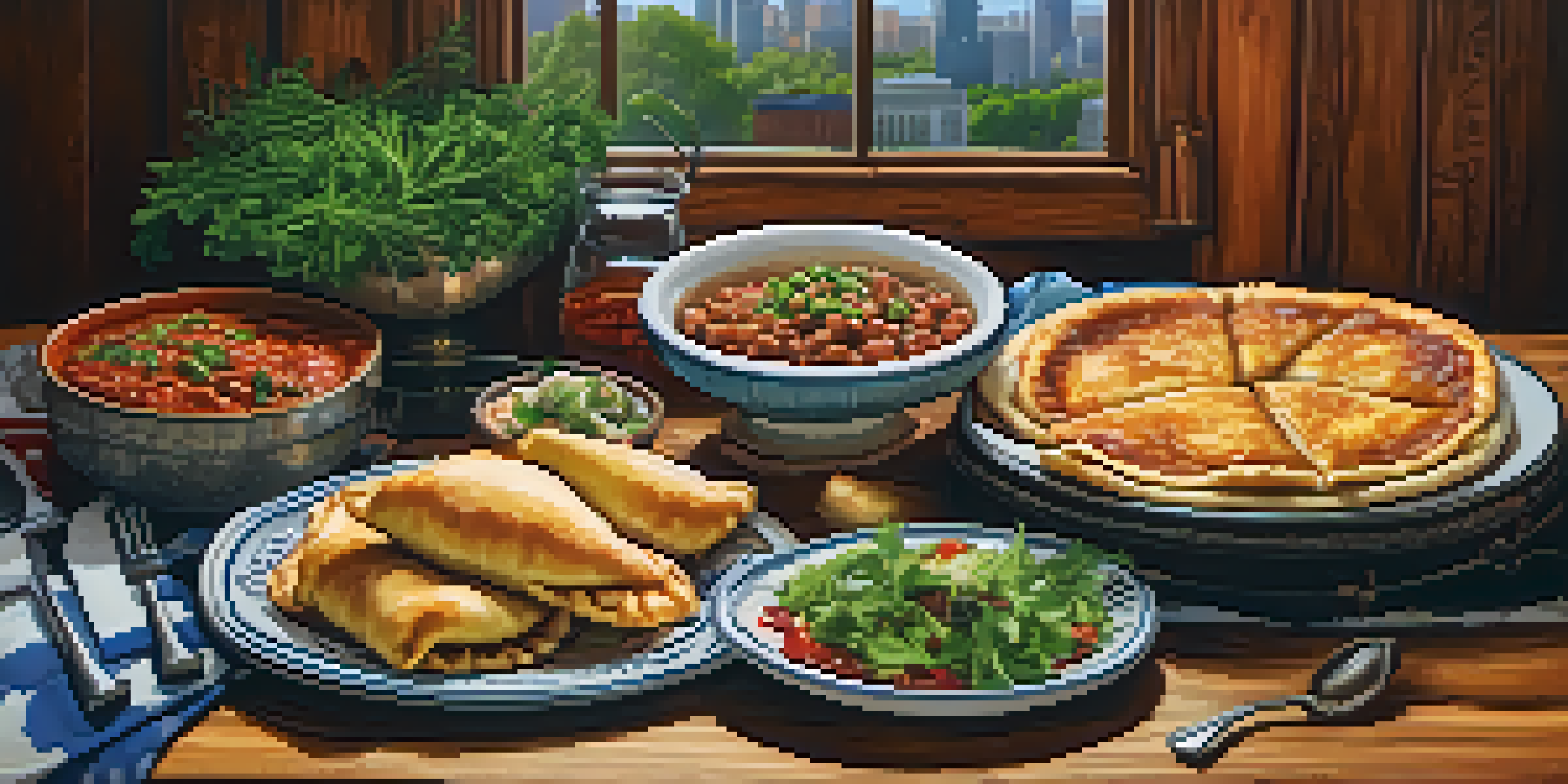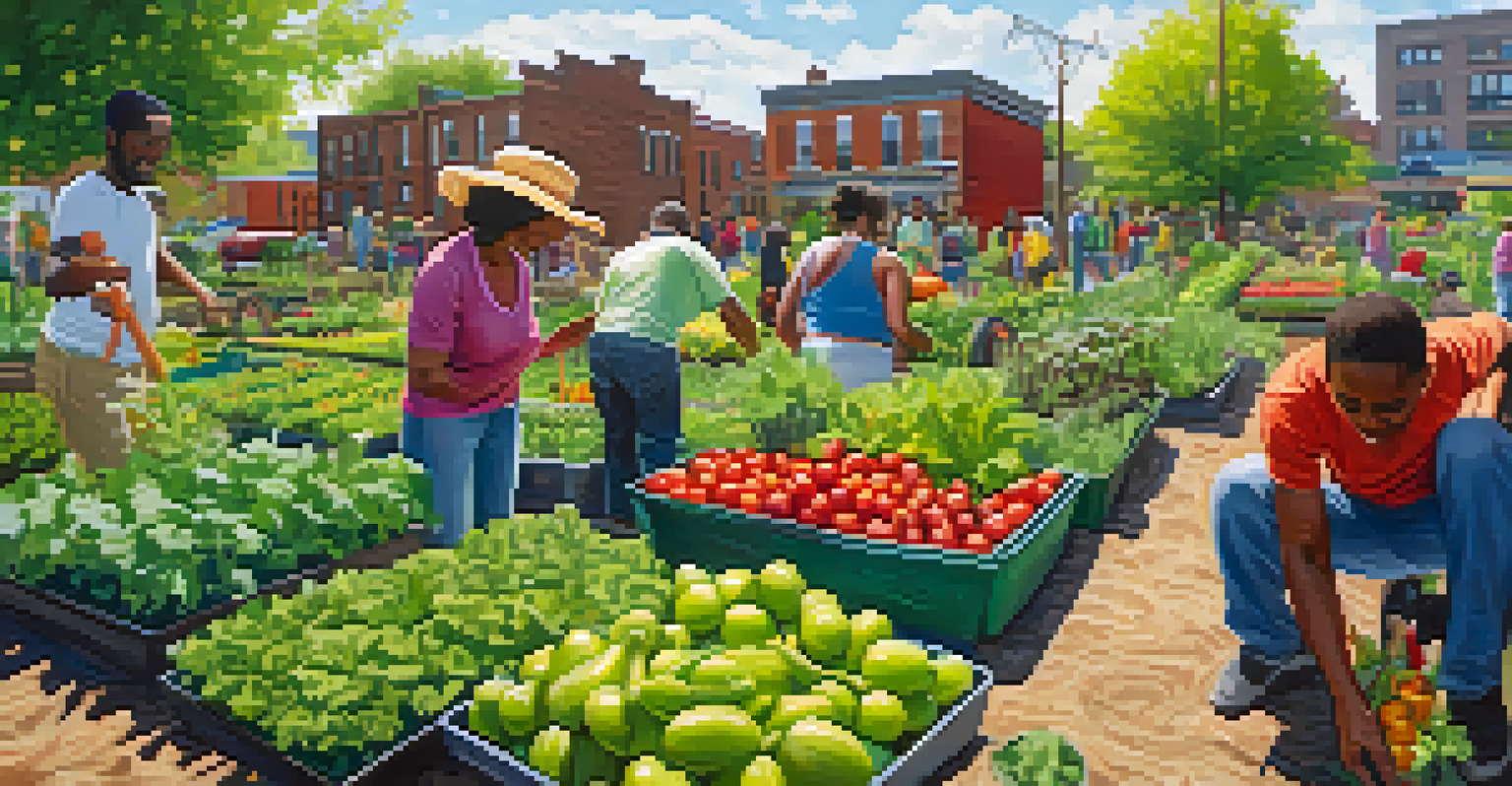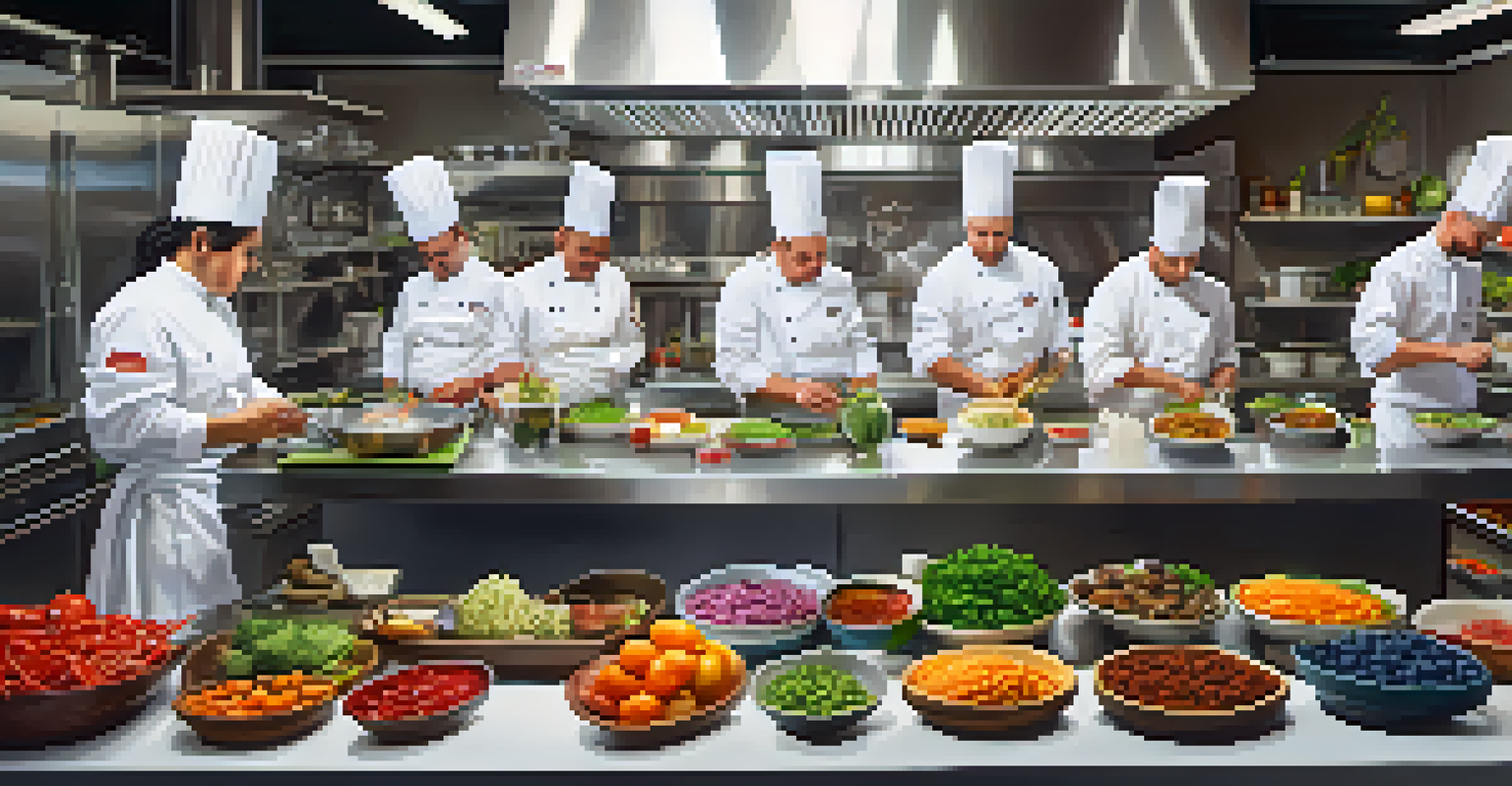Cultural Influences Shaping Detroit's Modern Food Landscape

The Melting Pot: Detroit's Culinary Diversity
Detroit has long been known as a melting pot of cultures, and this diversity is vividly reflected in its food scene. From Polish pierogies to Middle Eastern shawarma, the city is a testament to the myriad culinary traditions that coexist here. Each culture brings its own flavor, creating a rich tapestry of dining options that cater to all tastes.
Food is our common ground, a universal experience.
The impact of immigration, particularly from Eastern Europe and the Middle East, has infused the local palette with unique ingredients and cooking styles. This has not only broadened the culinary choices available but has also fostered a sense of community and identity among residents. Food festivals celebrating these diverse cuisines have become popular events that highlight this cultural richness.
As Detroit continues to evolve, the influence of these various cultures is also changing, with new generations of chefs experimenting and merging their heritage with contemporary techniques. This dynamic environment keeps the food scene fresh and exciting, drawing in both locals and visitors eager to experience the city's culinary offerings.
Farm-to-Table Movement: A Local Revival
In recent years, the farm-to-table movement has gained momentum in Detroit, emphasizing sustainable practices and local sourcing. This trend encourages restaurants to build relationships with local farmers and artisans, ensuring fresh ingredients while supporting the community. Diners are increasingly drawn to menus that showcase seasonal produce and highlight the flavors of the region.

This movement not only enhances the quality of food but also fosters a sense of responsibility among consumers. Knowing where their food comes from allows diners to appreciate the hard work of local producers and contributes to a more sustainable food system. Many restaurants are now proudly displaying the names of their suppliers, creating a transparent connection between the diner and the source.
Detroit's Culinary Diversity Thrives
The city showcases a rich tapestry of flavors from various cultures, making dining an exciting experience.
Moreover, the rise of urban agriculture in Detroit has played a pivotal role in this movement. Community gardens and urban farms are sprouting up throughout the city, providing fresh produce to neighborhoods that may have limited access to healthy food options. This grassroots effort is a testament to the resilience and creativity of the city's residents, further enriching Detroit's food landscape.
Reviving Tradition: Detroit's Historical Influences
Detroit's food landscape is deeply rooted in its history, with many traditional dishes making a comeback. Iconic foods, such as the Detroit-style pizza and coney dogs, are experiencing a renaissance, bringing nostalgia to locals and curiosity to newcomers. These dishes not only tell the story of the city's culinary past but also create a sense of belonging and pride among residents.
Cooking is like love. It should be entered into with abandon or not at all.
Restaurants are now embracing these historical influences, often modernizing classic recipes while staying true to their origins. This balance of tradition and innovation allows chefs to pay homage to the city's roots while appealing to contemporary palates. For instance, some eateries have started experimenting with vegan versions of traditional dishes, making them accessible to a wider audience.
As these historical influences continue to shape Detroit's food scene, they also serve as a reminder of the city's resilience. Each bite reflects the struggles and triumphs of its inhabitants, creating a culinary narrative that resonates with everyone who experiences it.
Culinary Innovation: Detroit's Emerging Chefs
A new wave of chefs is making headlines in Detroit, bringing innovative ideas and techniques to the table. These culinary trailblazers are not only redefining traditional dishes but also experimenting with international flavors, creating unique dining experiences. Their creativity is invigorating the local food scene and attracting attention from food enthusiasts across the nation.
Many of these emerging chefs are influenced by their own diverse backgrounds, which allows them to infuse their heritage into their cooking. This blend of cultures results in exciting fusion dishes that surprise and delight diners. For example, one might find a taco filled with traditional Middle Eastern ingredients, showcasing the beautiful intersection of culinary traditions.
Farm-to-Table Gains Popularity
The farm-to-table movement emphasizes local sourcing and sustainability, enhancing food quality and community support.
This spirit of innovation is further amplified by collaboration among chefs, local producers, and food enthusiasts. Pop-up restaurants and food events have become popular platforms for experimentation, enabling chefs to test new concepts and gather feedback. In this supportive environment, creativity flourishes, solidifying Detroit's reputation as a hotspot for culinary excellence.
Community Engagement: Food as a Unifying Force
Food has always been a powerful tool for community engagement, and in Detroit, this is especially evident. Community events, such as food festivals and cooking classes, bring people together, fostering connections and celebrating the city's diverse culinary heritage. These gatherings create opportunities for residents to share their stories and experiences through food, strengthening community bonds.
Moreover, local initiatives focused on food justice are addressing disparities in access to healthy foods. Programs that promote nutrition education and support local farmers are crucial in empowering communities. By advocating for equitable food systems, these initiatives ensure that everyone has the opportunity to enjoy fresh, nutritious meals.
As a result, Detroit's food scene is not just about dining; it's about collaboration, inclusivity, and shared experiences. The city's culinary landscape reflects the values of its residents, where food serves as a medium for dialogue and understanding, ultimately contributing to a more cohesive community.
The Role of Technology in Detroit's Food Scene
Technology is playing an increasingly vital role in shaping Detroit's modern food landscape. From food delivery apps to social media marketing, the digital age has transformed how restaurants connect with their customers. Chefs and restaurateurs are harnessing these tools to reach wider audiences, promote their menus, and engage with food lovers in real time.
Online platforms have also sparked the growth of food blogs and influencer partnerships, showcasing the city's culinary diversity. Food enthusiasts are sharing their dining experiences and recommending hidden gems, creating an organic buzz that attracts new patrons. This grassroots marketing approach has proven to be effective in promoting local eateries and elevating Detroit's food scene.
Sustainability Shapes Food Practices
Detroit's food scene is increasingly focused on sustainable practices, balancing delicious dining with environmental responsibility.
Furthermore, technology is enabling innovative dining experiences, such as virtual cooking classes and interactive dining events. These initiatives not only provide entertainment but also educate diners about different cuisines and cooking techniques. In this way, technology is not just a tool for convenience; it's a catalyst for creativity and connection within the local food community.
Embracing Global Flavors: Detroit's International Influence
As a city that has welcomed immigrants from around the world, Detroit's modern food landscape is rich with global flavors. Restaurants are increasingly incorporating international cuisines, offering diners the chance to experience a variety of tastes without leaving the city. From Ethiopian injera to Vietnamese pho, the city's culinary offerings reflect its diverse population and their cultural influences.
This globalization of food is not just about variety; it's also about promoting cultural exchange and understanding. Dining out becomes an opportunity for locals to immerse themselves in different traditions and learn about the stories behind the dishes. This cultural appreciation fosters a sense of unity within the community, as people come together to celebrate their differences through food.

Moreover, events such as international food festivals and culinary showcases are spotlighting Detroit's global influence. These gatherings highlight the city's diverse culinary talent and create an atmosphere of celebration and inclusivity. As Detroit embraces these global flavors, it not only enhances its food scene but also reinforces its identity as a vibrant, multicultural city.
Sustainability in Detroit's Food Practices
Sustainability is becoming a key focus in Detroit's food practices, with many restaurants and producers adopting eco-friendly approaches. From minimizing food waste to sourcing ingredients responsibly, the emphasis on sustainability is shaping how food is prepared and consumed. This commitment to the environment resonates with many diners who are increasingly conscious of their food choices.
Local initiatives aimed at promoting sustainable practices are gaining traction, such as community-supported agriculture (CSA) programs and urban farming projects. These efforts not only provide fresh, organic produce to residents but also encourage environmental stewardship. By supporting local farms and reducing the carbon footprint associated with food transportation, Detroit is fostering a healthier food system.
As sustainability continues to influence the food landscape, it becomes clear that the future of dining in Detroit lies in balancing taste and responsibility. Chefs and restaurateurs are paving the way for a more sustainable future, ensuring that the city's culinary legacy thrives while protecting the planet for generations to come.